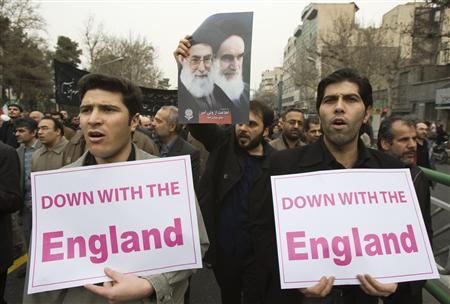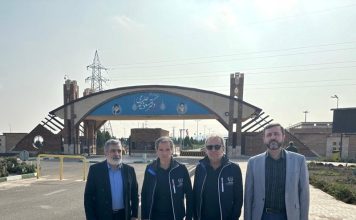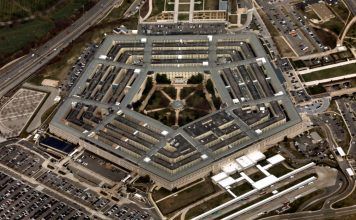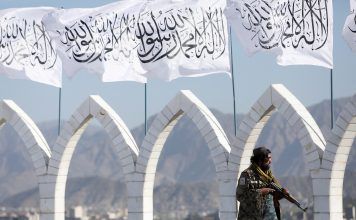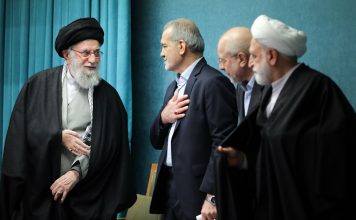Failure to tackle the Iranian State’s efforts at exporting its revolutionary ideology to the UK could become a problem if left unchallenged, according to Ali Ansari, a professor of Iranian history and director of the Institute for Iranian Studies at the University of St Andrews, in Scotland.
Analysts in the UK currently consider Iran a major menace to Britain’s security, after alleged threats by Iranian officials against UK-based journalists and the Islamic Republic’s supply of drones to Russia in its war against Ukraine. The Iranian regime’s revolutionary ideology has been described by leading Middle East historian Ervand Abrahamian, as a “complex combination” of Pan-Islamism, political populism, and Shia Islamic “religious radicalism.”
“There is evidence of Iranian attempts to suppress dissent among critics based in the United Kingdom as we have seen with threats to journalists,” Ansari, who is also a senior associate fellow at the London-based Royal United Services Institute (RUSI), told Kayhan Life. “There is little doubt that they have sought to increase their surveillance and have sought to act on that information to bring critics to heel.”
“The evidence now suggests that Iran’s government is extending these tactics to the UK itself. Such targeted attacks aside, they are also seeking to disseminate their particularly toxic revolutionary ideology, which if left unchallenged could become a problem,” Ansari said.
According to reports by the UK’s domestic intelligence service MI5 and by the Metropolitan Police, there have been a total of 15 murder and kidnap plots against Iranian-born individuals inside Britain. The alleged attacks were all attributed to Iranian state actors.
Several UK-based journalists at BBC Persian and media outlet Iran International said they had been threatened by agents working for the regime. Iran International closed its London-based broadcasting operation after Scotland Yard said it could not protect staff from attacks.
UK Home Secretary Suella Braverman is of the view that the Islamic Republic has become one of the biggest threats to national security, according to an Aug. 6 report by the Sunday Times.
Speaking to the Sunday Times, a Home Office official said: “The Iranian threat is the one that worries us the most. It’s a big issue because they are getting much more aggressive and their appetite is increasing. They are very defensive to anyone challenging their regime and just want to stamp it out. They are increasing their agitation.”
The Sunday Times also included details of several Islamic organizations, institutions and trusts in England which it said had financial and political connections to Iran’s regime. One of them, the Islamic Centre of England, a Maida Vale-based mosque, is currently under investigation by the Charity Commission, the U.K. body which oversees nonprofit organizations.
Claims by analysts that Iran’s Revolutionary Guards Corps masterminded the attempted attacks on British soil have led to growing calls by UK lawmakers to designate the IRGC as a terrorist organization.
Those calls have divided Britain’s government, resulting in a stand-off between the Home Office and the Foreign Office. Braverman has repeatedly called for the IRGC to be proscribed, while the UK’s Foreign Secretary James Cleverly has raised concerns that a designation could be counterproductive.
Threats to UK Journalists Writing About Iran, China and Hong Kong – Reporters Without Borders Survey
A consultation on the UK’s engagement with the Middle East and North Africa (MENA), launched on July 31 by the British Parliament’s Foreign Affairs Select Committee, has asked for views on the medium and long-term challenges facing countries in the region.
The consultation includes references to Iran. One question reads, “How can the UK work with its allies to curb Iran’s nuclear program and deter Iran from supporting terrorist groups and other hostile actions in the region?”
Another question asks, “How can and should the UK engage with countries whose regimes do not respect human rights but who may be important for our resilience strategy, counter-terrorism efforts, economic growth and green-energy transition, or who may need humanitarian assistance?”
Iran’s government has been condemned by international human rights watchdogs for its treatment of religious and ethnic minority groups, as well as women, children and the LGBTQ+ community in Iran. Its prolific use of the death penalty, which has disproportionately targeted anti-government protesters, has sparked a global outcry.
“In some Middle Eastern countries, human rights abuses are commonplace – including the use of capital punishment and the widespread oppression of women and LGBTQ+ people. Relations between countries in the MENA region can be fraught, with tensions risking bubbling up into full-blown conflict,” Foreign Affairs Committee Chair Alicia Kearns MP said.
“[The inquiry] will identify where the UK can best help reduce fragility, ask which countries the UK should focus its diplomatic efforts on, and how we balance concerns around human rights abuses with engagement,” the statement went on.
Meanwhile, Sir Richard Moore, the head of Britain’s overseas intelligence agency MI6, told Politico in an interview published July 19 that MI6 was focusing the vast majority of its resources on China. The comment followed a damning July 13 report by the UK’s Intelligence and Security Committee, which said the UK’s efforts to tackle perceived security threats by China were “completely inadequate.”

